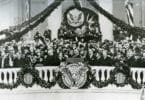William McKinley Jr. was born in Niles, Ohio, on January 29, 1843. He was the seventh of nine children born to William McKinley Sr. and Nancy Allison McKinley. When William was a young boy, the McKinley family moved to Poland, Ohio, where he attended local schools and showed a keen interest in education.
McKinley enrolled at Allegheny College in Meadville, Pennsylvania, but his studies were cut short due to illness and financial difficulties. He returned to Ohio and became a schoolteacher. However, his life took a dramatic turn with the outbreak of the Civil War.
Civil War Service
In 1861, at the age of 18, McKinley enlisted in the Union Army as a private in the 23rd Ohio Volunteer Infantry. He served with distinction under the command of future President Rutherford B. Hayes. McKinley’s bravery and leadership earned him several promotions, ultimately reaching the rank of brevet major by the end of the war. His wartime experience had a profound impact on his character and future political career.
Legal Career and Early Political Involvement
After the Civil War, McKinley studied law at Albany Law School in New York and was admitted to the bar in 1867. He established a successful legal practice in Canton, Ohio, where he became involved in local Republican politics. McKinley married Ida Saxton in 1871, the daughter of a prominent Canton banker. The couple had two daughters, Katherine and Ida, both of whom tragically died in childhood. Ida McKinley suffered from chronic illnesses and seizures, and the loss of their children took a heavy toll on her health.
Congressional Career
McKinley’s political career took off in 1876 when he was elected to the U.S. House of Representatives. He served in Congress for 14 years, becoming known for his expertise in tariff policy. As chairman of the House Ways and Means Committee, McKinley was the principal architect of the McKinley Tariff of 1890, which raised protective tariffs to their highest levels. While the tariff was intended to protect American industries, it also led to higher consumer prices and was controversial among voters.
Governorship of Ohio
After losing his congressional seat in the Democratic landslide of 1890, McKinley ran for governor of Ohio in 1891. He won the election and served two terms as governor from 1892 to 1896. As governor, McKinley focused on fiscal responsibility, tax reform, and support for business interests. His leadership and policies enhanced his national reputation and positioned him as a leading candidate for the presidency.
Path to the Presidency
In 1896, McKinley secured the Republican nomination for president, running on a platform of high tariffs and sound money. His campaign manager, Mark Hanna, orchestrated a highly effective campaign that emphasized McKinley’s commitment to economic stability and growth. McKinley defeated Democratic candidate William Jennings Bryan in a decisive victory, becoming the twenty-fifth President of the United States.
First Term as President (1897-1901)
Economic Policies
McKinley’s first term was marked by significant economic policies aimed at restoring prosperity. He signed the Dingley Tariff Act of 1897, which raised tariffs to protect American industries and promote economic growth. McKinley’s administration also supported the Gold Standard Act of 1900, which established gold as the sole standard for redeeming paper money, stabilizing the currency, and boosting investor confidence.
Spanish-American War
One of the most significant events of McKinley’s presidency was the Spanish-American War in 1898. The conflict was sparked by the explosion of the USS Maine in Havana Harbor and widespread public outrage over Spanish atrocities in Cuba. McKinley initially sought a peaceful resolution but ultimately asked Congress for a declaration of war. The swift and decisive American victory resulted in the Treaty of Paris, which ceded control of Puerto Rico, Guam, and the Philippines to the United States and granted Cuba its independence.
Expansion and Imperialism
The acquisition of new territories marked the United States’ emergence as a global power and sparked debates over imperialism. McKinley’s administration faced challenges in governing the newly acquired territories, particularly in the Philippines, where an armed insurrection against American rule broke out. The Philippine-American War lasted until 1902, raising questions about America’s role as an imperial power and its commitment to self-determination.
Personal Life and Character
McKinley’s personal life was marked by his deep devotion to his wife, Ida. Despite her chronic illnesses, McKinley was a loving and attentive husband, often adjusting his schedule to accommodate her needs. His character was defined by his integrity, patience, and calm demeanor, which earned him the respect and admiration of his peers.
Re-Election and Second Term
McKinley’s popularity and economic policies led to his re-election in 1900, with Theodore Roosevelt as his vice president. His second term began with a sense of optimism and a focus on continued economic growth and international diplomacy.
Assassination
Tragically, McKinley’s second term was cut short by an assassin’s bullet. On September 6, 1901, while attending the Pan-American Exposition in Buffalo, New York, McKinley was shot by anarchist Leon Czolgosz. Despite initial hopes for recovery, McKinley succumbed to his injuries on September 14, 1901. His death shocked the nation and led to an outpouring of grief.
Legacy and Impact
William McKinley’s presidency is often remembered for his leadership during the Spanish-American War and the expansion of American influence overseas. His economic policies helped stabilize the nation during a period of significant growth and transformation. McKinley’s assassination marked a turning point in American history, leading to the presidency of Theodore Roosevelt and the progressive reforms that followed.
Interesting Aspects of McKinley’s Presidency
Front Porch Campaign
McKinley’s 1896 presidential campaign was notable for its “front porch” strategy. Instead of traveling extensively, McKinley conducted his campaign from his home in Canton, Ohio, where he delivered speeches to visiting delegations. This approach, orchestrated by Mark Hanna, allowed McKinley to present a dignified and statesmanlike image while reaching a wide audience through the press.
Annexation of Hawaii
During McKinley’s presidency, the United States annexed Hawaii in 1898. The strategic importance of the Hawaiian Islands, particularly as a naval base at Pearl Harbor, was a key factor in the decision. The annexation further extended American influence in the Pacific and set the stage for Hawaii’s eventual statehood.
William McKinley’s life and presidency represent a pivotal period in American history, marked by economic growth, territorial expansion, and the emergence of the United States as a global power. From his humble beginnings in Ohio to his leadership during the Spanish-American War, McKinley’s journey reflects his dedication to public service and his commitment to national prosperity.
While his presidency faced challenges and controversies, McKinley’s efforts to stabilize the economy, protect American interests, and navigate the complexities of imperialism left a lasting legacy. His tragic assassination underscored the vulnerabilities of public office and the importance of presidential security. McKinley’s story serves as an enduring reminder of the complexities and responsibilities of leadership during times of change and transformation.
Read More:
President McKinley: Architect of the American Century by Robert W. Merry
This comprehensive biography by Robert W. Merry offers an in-depth look at McKinley’s life, political career, and presidency, highlighting his significant achievements and challenges.
William McKinley and His America by Howard Wayne Morgan
Howard Wayne Morgan’s biography provides a detailed account of McKinley’s life, political career, and the impact of his presidency on American history.
In the Days of McKinley by Margaret Leech
This Pulitzer Prize-winning book by Margaret Leech offers a richly detailed narrative of McKinley’s presidency and the era in which he served.
The Triumph of William McKinley: Why the Election of 1896 Still Matters by Karl Rove
Karl Rove’s book explores the 1896 presidential campaign and its significance, providing insights into McKinley’s political strategy and leadership.
William McKinley: The American Presidents Series: The 25th President, 1897-1901 by Kevin Phillips
Part of The American Presidents Series, this concise biography by Kevin Phillips offers an accessible overview of McKinley’s life and presidency.






